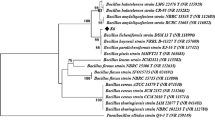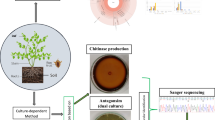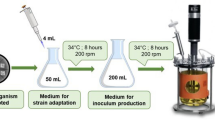Abstract
Penicillium species have been studied as producers of plant cell wall degrading enzymes to deconstruct agricultural residues and to be applied in industrial processes. Natural environments containing decaying plant matter are ideal places for isolating fungal strains with cellulolytic and xylanolytic activities. In the present study, Cerrado soil samples were used as source of filamentous fungi able to degrade xylan and cellulose. Penicillium was the most abundant genus among the obtained xylan and carboxymethylcellulose degraders. Penicillium polonicum was one of the best enzyme producers in agar-plate assays. In addition, it secretes CMCase, Avicelase, pectinase, mannanase, and xylanase during growth in liquid media containing sugarcane bagasse as carbon source. The highest value for endo-β-1,4-xylanase activity was obtained after 4 days of growth. Xyl PP, a 20 kDa endo-β-1,4-xylanase, was purified and partially characterized. The purified enzyme presented the remarkable feature of being resistant to the lignin-derived phenolic compounds, p-coumaric and trans-ferulic acids. This feature calls for its further use in bioprocesses that use lignocellulose as feedstock. Furthermore, future work should explore its structural features which may contribute to the understanding of the relationship between its structure and resistance to phenolic compounds.






Similar content being viewed by others
6. References
Alokika A, Singh D, Singh B (2018) Utility of acidic xylanase of Bacillus subtilis subsp. subtilis JJBS250 in improving the nutritional value of poultry feed. 3 Biotech 812(8):1–7. https://doi.org/10.1007/S13205-018-1526-2
Al-Samarrai TH, Schmid J (2000) A simple method for extraction of fungal genomic DNA. Lett Appl Microbiol 30:53–56. https://doi.org/10.1046/J.1472-765X.2000.00664.X
Anisimova M, Gil M, Dufayard JF et al (2011) Survey of branch support methods demonstrates accuracy, power, and robustness of fast likelihood-based approximation schemes. Syst Biol 60:685–699
Backus MP, Stauffer JF, Johnson MJ (1946) Penicillin yields from new mold strains. J Am Chem Soc 68:152–153. https://doi.org/10.1021/ja01205a518
Beaugrand J, Chambat G, Wong VWK et al (2004) Impact and efficiency of GH10 and GH11 thermostable endoxylanases on wheat bran and alkali-extractable arabinoxylans. Carbohydr Res 339:2529–2540. https://doi.org/10.1016/J.CARRES.2004.08.012
Beg QK, Kapoor M, Mahajan L, Hoondal GS (2001) Microbial xylanases and their industrial applications: a review. Appl Microbiol Biotechnol 56:326–338. https://doi.org/10.1007/s002530100704
Boruah P, Dowarah P, Hazarika R et al (2016) Xylanase from Penicillium meleagrinum var. viridi fl avum e a potential source for bamboo pulp bleaching. J Clean Prod 116:259–267. https://doi.org/10.1016/j.jclepro.2015.12.024
Boukari I, O’Donohue M, Rémond C, Chabbert B (2011) Probing a family GH11 endo-β-1,4-xylanase inhibition mechanism by phenolic compounds: role of functional phenolic groups. J Mol Catal B Enzym 72:130–138. https://doi.org/10.1016/j.molcatb.2011.05.010
Bradford MM (1976) A rapid and sensitive method for the quantitation of microgram quantities of protein utilizing the principle of protein-dye binding. Anal Biochem 72:248–254. https://doi.org/10.1016/0003-2697(76)90527-3
Celestino JDR, De CLE, Lima MDP et al (2014) Bioprospecting of Amazon soil fungi with the potential for pigment production. Process Biochem 49:569–575. https://doi.org/10.1016/j.procbio.2014.01.018
Coêlho MC, Rocha JC, Santos FA, Gonçalves JCR, Vasconcelos SM, Grisi TCSL, Santos SFM, Araújo DAM, Carvalho-Gonçalves LCT (2021) Use of agroindustrial wastes for the production of cellulases by Penicillium sp. FSDE15. J King Saud Univ Sci. https://doi.org/10.1016/j.jksus.2021.101553
Couturier M, Ladevèze S, Sulzenbacher G et al (2018) Lytic xylan oxidases from wood-decay fungi unlock biomass degradation. Nat Chem Biol 14:306–310. https://doi.org/10.1038/nchembio.2558
da Delabona P, S, Pirota RDPB, Codima CA, et al (2012) Using Amazon forest fungi and agricultural residues as a strategy to produce cellulolytic enzymes. Biomass Bioenerg 37:243–250. https://doi.org/10.1016/j.biombioe.2011.12.006
de Castro AMH, de Albuquerque Carvalho ML, Leite SGF, Pereira N (2010) Cellulases from Penicillium funiculosum: production, properties and application to cellulose hydrolysis. J Ind Microbiol Biotechnol 37:151–158. https://doi.org/10.1007/s10295-009-0656-2
de Silva COG, Aquino EN, Ricart CAO et al (2015) GH11 xylanase from Emericella nidulans with low sensitivity to inhibition by ethanol and lignocellulose-derived phenolic compounds. FEMS Microbiol Lett 362:1–8. https://doi.org/10.1093/femsle/fnv094
De Castro AP, Da Silva MRSS, Quirino BF et al (2016) Microbial diversity in cerrado biome (neotropical savanna) soils. PLoS ONE 11:1–16. https://doi.org/10.1371/journal.pone.0148785
De Souza Moreira LR, De Carvalho CM, De Siqueira PHVM et al (2013) Two ??-xylanases from Aspergillus terreus: characterization and influence of phenolic compounds on xylanase activity. Fungal Genet Biol 60:46–52. https://doi.org/10.1016/j.fgb.2013.07.006
Dhillon A, Gupta JK, Jauhari BM, Khanna S (2000) A cellulase-poor, thermostable, alkalitolerant xylanase produced by Bacillus circulans AB 16 grown on rice straw and its application in biobleaching of eucalyptus pulp. Bioresour Technol 73:273–277. https://doi.org/10.1016/S0960-8524(99)00116-9
Duarte G, Moreira L, Gómez-Mendoza D et al (2012a) Use of residual biomass from the textile industry as carbon source for production of a low-molecular-weight xylanase from Aspergillus oryzae. Appl Sci 2:754–772. https://doi.org/10.3390/app2040754
Duarte GC, Moreira LRS, Jaramillo PMD, Filho EXF (2012b) Biomass-derived inhibitors of holocellulases. Bioenergy Res 5:768–777. https://doi.org/10.1007/s12155-012-9182-6
Ferreira de Araujo AS, Bezerra WM, dos Santos VM et al (2017) Fungal diversity in soils across a gradient of preserved Brazilian Cerrado. J Microbiol. https://doi.org/10.1007/s12275-017-6350-6
Geiger G, Livingston MP, Funk F, Schulin R (1998) β-glucosidase activity in the presence of copper and goethite. Eur J Soil Sci 49:17–23. https://doi.org/10.1046/J.1365-2389.1998.00135.X
Ghosh S (2008) Novel cellulases from an extremophilic filamentous fungi Penicillium citrinum: production and characterization. J Ind Microbiol Biotechnol. https://doi.org/10.1007/s10295-008-0304-2
Gomes TC, Silva LMB, Ticona ARP et al (2019) Biochemical properties of carbohydrate-active enzymes synthesized by penicillium chrysogenum using corn straw as carbon source. Waste Biomass Valoriz. https://doi.org/10.1007/s12649-019-00589-x
Gonçalves GAL, Takasugi Y, Jia L et al (2015) Synergistic effect and application of xylanases as accessory enzymes to enhance the hydrolysis of pretreated bagasse. Enzyme Microb Technol 72:16–24. https://doi.org/10.1016/j.enzmictec.2015.01.007
Grigoriev IV, Nikitin R, Haridas S et al (2014) MycoCosm portal: gearing up for 1000 fungal genomes. Nucleic Acids Res 42:D699–D704. https://doi.org/10.1093/NAR/GKT1183
Haas H, Herfurth E, Stöffler G, Redl B (1992) Purification, characterization and partial amino acid sequences of a xylanase produced by Penicillium chrysogenum. Biochim Biophys Acta 1117:279–286. https://doi.org/10.1016/0304-4165(92)90025-P
Hawksworth DL, Rossman AY (1997) Where are all the undescribed fungi? Phytopathology 87:888–891. https://doi.org/10.1094/PHYTO.1997.87.9.888
Hernández YML, Kuss AV, Peil GHS et al (2020) Bioprospection of cellulose-decomposers soil bacteria/bioprospecção de bactérias do solo degradadoras de celulose. Braz J Dev 6:48831–48851. https://doi.org/10.34117/BJDV6N7-506
Jeong M, Choi D, Cheon W, Kim J (2021) Pyrosequencing and taxonomic composition of the fungal community from soil of Tricholoma matsutake in gyeongju. J Microbiol Biotechnol 31:686–695. https://doi.org/10.4014/jmb.2103.03021
Jiang X, Zhai R, Leng Y et al (2022) Understanding the toxicity of lignin-derived phenolics towards enzymatic saccharification of lignocellulose for rationally developing effective in-situ mitigation strategies to maximize sugar production from lignocellulosic biorefinery. Bioresour Technol 349:126813. https://doi.org/10.1016/J.BIORTECH.2022.126813
Kabel MA, van den Borne H, Vincken JP et al (2007) Structural differences of xylans affect their interaction with cellulose. Carbohydr Polym 69:94–105. https://doi.org/10.1016/j.carbpol.2006.09.006
Katoh K, Misawa K, Kuma K, Miyata T (2002) MAFFT: a novel method for rapid multiple sequence alignment based on fast Fourier transform. Nucleic Acids Res 30:3059–3066
Kim Y, Ximenes E, Mosier NS, Ladisch MR (2011) Soluble inhibitors/deactivators of cellulase enzymes from lignocellulosic biomass. Enzyme Microb Technol 48:408–415. https://doi.org/10.1016/j.enzmictec.2011.01.007
Knob A, Beitel SM, Fortkamp D et al (2013) Production, purification, and characterization of a major penicillium glabrum xylanase using brewer’s spent grain as substrate. Biomed Res Int. https://doi.org/10.1155/2013/728735
Kumar V, Shukla P (2015) Functional aspects of xylanases toward industrial applications. Frontier discoveries and innovations in interdisciplinary microbiology. Springer India, Berlin, pp 157–165
LadeiraÁzar RIS, Morgan T, dos Santos ACF et al (2018) Deactivation and activation of lignocellulose degrading enzymes in the presence of laccase. Enzyme Microb Technol 109:25–30. https://doi.org/10.1016/j.enzmictec.2017.09.007
Laemmli UK (1970) Cleavage of structural proteins during the assembly of the head of bacteriophage T4. Nature 227:680–685
Liao H, Zheng H, Li S et al (2015) Functional diversity and properties of multiple xylanases from Penicillium oxalicum GZ-2. Sci Rep 5:1–14. https://doi.org/10.1038/srep12631
Liu Z, Wen S, Wu G, Wu H (2022) Heterologous expression and characterization of Anaeromyces robustus xylanase and its use in bread making. Eur Food Res Technol 248:2311–2324. https://doi.org/10.1007/S00217-022-04047-2/FIGURES/8
Lopes AM, Ferreira Filho EX, Moreira LRS (2018) An update on enzymatic cocktails for lignocellulose breakdown. J Appl Microbiol 125:632–645. https://doi.org/10.1111/jam.13923
Marks D, Glyphis J, Leighton M (1987) Measurement of protein in tannin-protein precipitates using ninhydrin. J Sci Food Agric 38:255–261. https://doi.org/10.1002/jsfa.2740380309
Melati RB, Schmatz AA, Pagnocca FC et al (2017) Sugarcane bagasse: production, composition, properties, and feedstock potential. Sugarcane Prod Syst Uses Econ Importance 2:1–38
Mesa L, González E, Romero I et al (2011) Comparison of process configurations for ethanol production from two-step pretreated sugarcane bagasse. Chem Eng J 175:185–191. https://doi.org/10.1016/j.cej.2011.09.092
Miller GL (1959) Use of dinitrosaiicyiic acid reagent for determination of reducing sugar. Anal Chem 3:426–428
Monclaro AV, Recalde GL, da Silva FG et al (2019) Xylanase from Aspergillus tamarii shows different kinetic parameters and substrate specificity in the presence of ferulic acid. Enzyme Microb Technol. https://doi.org/10.1016/j.enzmictec.2018.09.009
Morrison D, Van Dyk JS, Pletschke BI (2011) The effect of alcohols, lignin and phenolic compounds on the enzyme activity of. BioResources 6:3132–3141
Mutreja R, Das D, Goyal D, Goyal A (2011) Bioconversion of agricultural waste to ethanol by SSF using recombinant cellulase from clostridium thermocellum. Enzyme Res 2011:340279. https://doi.org/10.4061/2011/340279
Nielsen JC, Grijseels S, Prigent S et al (2017) Global analysis of biosynthetic gene clusters reveals vast potential of secondary metabolite production in Penicillium species. Nat Microbiol. https://doi.org/10.1038/NMICROBIOL.2017.44
Nuero OM, Reyes F (2002) Enzymes for animal feeding from Penicillium chrysogenum mycelial wastes from penicillin manufacture. 413–416
Oakley AJ, Heinrich T, Thompson CA, Wilce MCJ (2003) Characterization of a family 11 xylanase from Bacillus subtillis B230 used for paper bleaching. Acta Crystallogr Sect D Biol Crystallogr 59:627–636. https://doi.org/10.1107/S0907444903001227
Ogunmolu FE, Kaur I, Gupta M et al (2015) Proteomics Insights into the biomass hydrolysis potentials of a hypercellulolytic fungus penicillium funiculosum. J Proteome Res 14:4342–4358. https://doi.org/10.1021/acs.jproteome.5b00542
Oh HI, Hoff JE, Armstrong GS, Haff LA (1980) Hydrophobic interaction in tannin-protein complexes. Food Chem 28:394–398
Oliveira ICM, Garay AV, Souza AA et al (2022) Structural and biochemical analysis reveals how ferulic acid improves catalytic efficiency of Humicola grisea xylanase. Sci Rep 121(12):1–22. https://doi.org/10.1038/s41598-022-15175-w
Pandey Soccol CR, Nigam P, Soccol VTA (2000) Biotechnological potential of agro-industrial residues. I: Sugarcane bagasse. Bioresour Technol 74:69–80. https://doi.org/10.1016/S0960-8524(99)00142-X
Park MS, Fong JJ, Oh SY et al (2014) Marine-derived Penicillium in Korea: diversity, enzyme activity, and antifungal properties Antonie Van Leeuwenhoek. Int J Gen Mol Microbiol 106:331–345. https://doi.org/10.1007/s10482-014-0205-5
Pérez-Cantero A, Guarro J (2020) Sarocladium and acremonium infections: new faces of an old opportunistic fungus. Mycoses 63:1203–1214
Petit P, Lucas EMF, Abreu LM et al (2009) Novel antimicrobial secondary metabolites from a Penicillium sp. isolated from Brazilian cerrado soil. Electron J Biotechnol. https://doi.org/10.2225/vol12-issue4-fulltext-9
Polizeli MLTM, Rizzatti ACS, Monti R et al (2005) Xylanases from fungi: properties and industrial applications. Appl Microbiol Biotechnol 67:577–591. https://doi.org/10.1007/s00253-005-1904-7
Qin L, Li WC, Liu L et al (2016) Inhibition of lignin-derived phenolic compounds to cellulase. Biotechnol Biofuels 9:1–10. https://doi.org/10.1186/s13068-016-0485-2
Saha BC (2003) Purification and properties of an extracellular ??-xylosidase from a newly isolated Fusarium proliferatum. Bioresour Technol 90:33–38. https://doi.org/10.1016/S0960-8524(03)00098-1
Savage AV, Gubitz GM, Nolan K et al (2003) Purification and characterization of a new low molecular weight endoxylanase from Penicillium capsulatum. Enzyme Microb Technol 33:775–785. https://doi.org/10.1016/s0141-0229(03)00176-5
Silva LMBL, Gomes TCTC, Ullah SFSF et al (2019) Biochemical properties of carbohydrate-active enzymes synthesized by penicillium chrysogenum using corn straw as carbon source. Waste Biomass Valoriz. https://doi.org/10.1007/s12649-019-00589-x
Srinivasan MC, Rele MV (1999) Microbial xylanases for paper industry. Curr Sci 77:137–142
Stamatakis A, Hoover P, Rougemont J (2008) A rapid bootstrap algorithm for the RAxML web servers. Syst Biol 57:758–771. https://doi.org/10.1080/10635150802429642
Subramanian S, Prema P (2002) Biotechnology of microbial xylanases: enzymology. Mol Biol Appl 22:33–46. https://doi.org/10.1080/07388550290789450
Tarayre C, Bauwens J, Brasseur C et al (2015) Isolation and cultivation of xylanolytic and cellulolytic Sarocladium kiliense and Trichoderma virens from the gut of the termite Reticulitermes santonensis. Environ Sci Pollut Res 22:4369–4382. https://doi.org/10.1007/s11356-014-3681-2
Tejirian A, Xu F (2011) Inhibition of enzymatic cellulolysis by phenolic compounds. Enzyme Microb Technol 48:239–247. https://doi.org/10.1016/j.enzmictec.2010.11.004
Teng C, Yan Q, Jiang Z et al (2010) Production of xylooligosaccharides from the steam explosion liquor of corncobs coupled with enzymatic hydrolysis using a thermostable xylanase. Bioresour Technol 101:7679–7682. https://doi.org/10.1016/j.biortech.2010.05.004
Terrone CC, de Freitas C, Rafael C et al (2018) Agroindustrial biomass for xylanase production by Penicillium chrysogenum: purification, biochemical properties and hydrolysis of hemicelluloses. Electron J Biotechnol 33:39–45. https://doi.org/10.1016/j.ejbt.2018.04.001
Tian Y, Jiang Y, Ou S (2013) Interaction of cellulase with three phenolic acids. Food Chem 138:1022–1027. https://doi.org/10.1016/j.foodchem.2012.10.129
Ullah SFSF, Souza AA, Hamann PRVPRV et al (2019) Structural and functional characterisation of xylanase purified from Penicillium chrysogenum produced in response to raw agricultural waste. Int J Biol Macromol. https://doi.org/10.1016/j.ijbiomac.2019.01.057
Ullah SF, Souza AA, de Freitas SM, Noronha EF (2022) Characterisation of biomass degrading xylanolytic enzymes of Penicillium chrysogenum produced using sugarcane bagasse. Process Biochem 112:62–70. https://doi.org/10.1016/J.PROCBIO.2021.11.012
Vaishnav N, Singh A, Adsul M et al (2018) Penicillium: the next emerging champion for cellulase production. Bioresour Technol Rep 2:131–140. https://doi.org/10.1016/j.biteb.2018.04.003
Visagie CM, Houbraken J, Frisvad JC et al (2014) Identification and nomenclature of the genus Penicillium. Stud Mycol 78:343–371. https://doi.org/10.1016/j.simyco.2014.09.001
Wang J, Liu Y, Yang Y et al (2020) High-level expression of an acidic thermostable xylanase in Pichia pastoris and its application in weaned piglets. J Anim Sci. https://doi.org/10.1093/JAS/SKZ364
Acknowledgements
The authors would like to thank the University of Brasilia, FAP-DF, CAPES, and CNPq for research grants received during the execution of this study. Eliane F. Noronha is a recipient of the CNPq research fellowship. Pedro R.V. Hamann and Alonso R.P. Ticona are former CAPES doctoral degree scholarships recipients. Brenda R. de Camargo is a former recipient of CNPq doctoral degree scholarship. Eliane. F Noronha would like to thank, Professor Dr. Luís R. Batista from Departamento de Ciência dos Alimentos—Universidade Federal de Lavras—Brazil, for his valuable help in fungi morphological identification.
Author information
Authors and Affiliations
Corresponding author
Ethics declarations
Conflict of interest
On behalf of all authors, the corresponding author states that there is no conflict of interest.
Supplementary Information
Below is the link to the electronic supplementary material.
Rights and permissions
Springer Nature or its licensor (e.g. a society or other partner) holds exclusive rights to this article under a publishing agreement with the author(s) or other rightsholder(s); author self-archiving of the accepted manuscript version of this article is solely governed by the terms of such publishing agreement and applicable law.
About this article
Cite this article
de Camargo, B.R., Takematsu, H.M., Ticona, A.R.P. et al. Penicillium polonicum a new isolate obtained from Cerrado soil as a source of carbohydrate-active enzymes produced in response to sugarcane bagasse. 3 Biotech 12, 348 (2022). https://doi.org/10.1007/s13205-022-03405-x
Received:
Accepted:
Published:
DOI: https://doi.org/10.1007/s13205-022-03405-x




